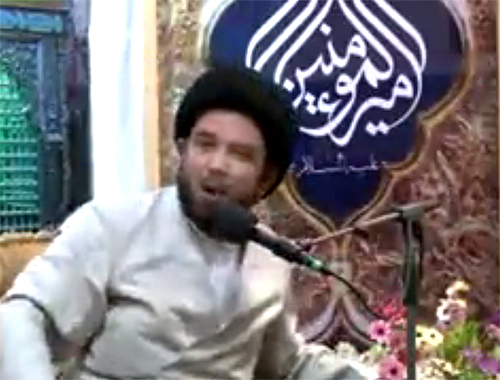Chapter Two: Outcome of Definition (of God)
- Details
- Hits: 9146
Chapter Two: Outcome of Definition (of God)
1-Characteristics of Innate Disposition 'Fitrat')
Just as it was seen in the first section the outcome of definition of God is a Ma'refat (gnosis) very sublime and a recognition conscientious with regard to Divine Essence. The result of definition (of God) is neither belief in God nor inclination nor ability and capability in recognizing God, nor empirical knowledge and not (even) intuitive knowledge in the common sense. Rather, Ma'refat and recognition is much more higher and exalted than the common human sciences and therefore it cannot be inserted into the usual divisions of human sciences.
Nevertheless, some of the above matters are certain and correct in its own place. However the whole truth is that none of these interpretations can be a true exposition of the foundation of monotheistic Fitrat in the divine religions.
In the entire reasoning of Fitrat (innate disposition) the talk is about Ma'refat, witnessing with clearness and heartly observation and examination. It is obvious to what extent an appreciable and fundamental difference exists between these two basis, which is oftenly overlooked.
For clarifying the matter, we shall briefly make a comparative examination of these views:
A) Fitrat (Innate Disposition) is Not a Belief
As per our past sayings, what is meant by monotheistic Fitrat is Ma'refat and recognition, not belief in God. Although after the recognition of God man oftenly submits himself before God just as God has taken this belief, confirmation and confession from all the human-beings in the previous worlds, yet considering the fact that this present world is the place of test and affliction and man's misgivings and carnal desires are no less and on the other hand man is the possessor of will-power and authority it therefore cannot be said that every human-being necessarily believes in God. Even though the lofty Ma'refat is from the Blessed and Supreme God its bearer gets reminded by the reminding of the exhorters and by propaganda of the evangelists and oftenly he finds belief and faith too in God.
With this explanation of Fitrat there will no longer remain a place for asking this question that why some of the people deny God. This is because Fitrat is Ma'refat (gnosis) and the authority of admission and rejection is entrusted to man. Thus it is endowed with good and evil and reward or punishment pertains to them.
In addition, when the same Fitrat becomes shy due to the external factors, the light of reality remains hidden from man.
(*)
In the discussion of 'submission and faith' this matter will be examined in a more detailed form.
B) Fitrat is Not Inclination towards God
In spite of this, inasmuch as man by his divine Fitrat finds the Compassionate and Merciful, Generous and Gracious, Graceful and Intimate God with all his existence, he therefore inclines towards Him and loves Him. Thus inclination is newly from Fitrat.
As such, the one who observes his God in the light of Fitrat with the qualities of Beauty and Magnificence will pay close attention to Him and will not submit his heart to anyone other than Him. Basically true love can be found in the true Beloved and whatever is other than Him is wish carnal desires and egotism even though it may be expressed in beautiful words and the one who reckons the metaphor to be the castle of reality is far from reality:
(*) (Dua-e-Arafa; Imam Hussain (A.S.) - Mafatihul Jenan)
Yes, the one whose existence has been filled with desires, arrogance, pride, obstinacy and darkness has not left any place for light in his heart and will not have any inclination too towards God. As such, the question that why Pharaoh, Niraun, Abu Jahl, Abu Lahab, Chenghiz and Timur did not have any attraction and inclination towards God will stand no credit. The description of this matter will come in the section of 'Submission'.
C) 'Fitrat' is Not an Ability to Know God
Basically the power to know God is given to man when he has not recognized God. Thus at that time the power and ability of this recognition will be given to him so that by this means he recognizes God. However, just as we had seen previously, the Ma'refat (gnosis) of God has been granted to man in a very clear and expounded manner. Thus there remains no place for power and ability because the outcome of ability will be the acquisition of some affair whereas the Ma'refat is (already) obtained and present near man in the most highest form even though it may be concealed.
Yes, if we say that man is capable of remembering the Ma'refat of God and becomes reminded after the reminding of the exhorters and or man is having the ability to do reasoning and argumentation for proving the same innate Ma'refat then such a saying is absolutely correct and man is possessing such abilities. However these are having no relation with the 'Fitrat' (innate disposition) which is the fundamental of religion and they should not be used in explaining and justifying that Fitrat.
2-Innate 'Ma'refat' is a Comprehensive and Clear 'Ma'refat' not Abstract and Ambiguous
Quran and traditions have interpreted innate Ma'refat to be a heartly vision and a self-evident examination and observation. (Tauheed of Sadooq; Pg. 107; chapter 8. Similarly Usul-e-Kafi; vol. 2; Pg. 13 and Behar al-Anwar; vol. 5; Pg. 223, 227)
These wordings of Quran and traditions, in the most audible expression indicate the clearness of the Ma'refat (gnosis) of God and the intensity of its lucidity in the heart and mind of man. As such, this saying that due to the weakness and ambiguity of innate Ma'refat and its vagueness in the field of recognition one should embark upon intellectual and conceptual recognition and or this saying that innate Ma'refat is abstract and within one's power and one should in this world expound it through reasoning and proofs, will in reality amount to comparison (equation) of Quranic innate Ma'refat with the innate Ma'aref of 'Dakaart' and 'Laibnites' and reminds one of the beliefs of recent 'Rationalism' as against 'Amperism'
The luminousness and holiness of the past innate Ma'refat (gnosis) is so intense that the firmness of the foundations of religion in the nature of man is indebted to the firmness of this Ma'refat. The expression of vision and examination is so expressive in the lucidity and authenticity of this recognition that it has also perplexed the traditionalists and so they were putting forth this question that whether God can be seen with the physical eyes or not? The Holy Imams too would reply that by such expression is meant heartly vision and not vision with the physical eyes or perceptions with mental and heartly illusions. (Some of these proofs will come under point no. 5)
Paying attention to the following point can to a large degree be a reply to the existing doubts about innate Ma'refat. Just as it was seen in some of the traditions in Section One, this examination has been forgotten by man and the one who has made to forget is God.
(*) (Behar al-Anwar; vol. 5; Pg. 223)
As such, man forgets the Ma'refat at the time of birth and it is after the gradual passage of some time and especially after the reminding of the exhorters and warnings of the warners that he once again remembers the same Ma'refat.
(*)
“Did we not preserve you alive long enough, so that he who would be mindful in it should mind? And there came to you the warner…” (Holy Quran: Fatir: 37)
In some of the traditions the maximum age for getting reminded has been mentioned to be eighteen. (Burhan; vol. 3; Pg. 336; Traditions 3 and 4)
Based on the above explanation, reasoning out this verse
(*)
“And Allah has brought you forth from the wombs of your mothers - you did not know anything…” (Holy Quran: Nahl: 78)
For denying, 'Fitrat' will not have the kind of granted and esteem 'Ma'refat'. It has been said that the above verse rejects any kind of past Ma'refat whereas just as it can be precisely perceived, this holy verse negates knowledge and awareness at the time of birth and does not say anything in connection with the past awareness which is made to be forgotten at the time of birth and is remembered by man after a lapse of some period. These past Ma'refats have been mentioned and emphasized in other verses and traditions and it is even specifically mentioned that this Ma'refat is made to be forgotten at the time of birth. Therefore there exists no contradiction between those verses which prove the past Ma'refat and the above verse. Rather the verses explain and clarify each other.
Another matter, which becomes clear from the above description is that theology (i.e. recognition of God) being innate is not a reason of being independent from 'reminding'. Rather the vice-versa is also true. We shall once more refer to this matter in the chapter of 'reminding'.
Another conclusion which we can derive from the above discussion is that 'Fitrat' and 'reminding' as a means of guidance for man are alone counted to be a strong reason and an independent channel. Rather it can be claimed that a superior and genuine Ma'refat of God is the same Ma'refat which is acquired from Him and the other ways and means of recognizing God should eventually lead to and terminate in this very innate Ma'refat. On the other hand acquiring the strange ways instead of Fitrat (innate disposition) will be a strange Ma'refat different from the innate and genuine Ma'refat.
(*) (Usul-e-Kafi; vol. 1; Pg. 114)
How be it that the one who imagines he has recognized God through a means other than His means is a monotheist! Surely, only the one who has recognized God by (means of) God has truly recognized Him and anything besides this will be recognition of someone else and not God.
This matter was already mentioned in the first section and it will again be discussed in the chapter of 'reminding'.
3-Before Becoming Reminded, Innate Ma'refat is Simple not Absolute.
By simple, we mean that man is heedless and takes no notice of his innate Ma'refat and by absolute we mean being heedful of Ma'refat.
This too is one of the mysteries of God where man, because of being busy in his daily life, oftenly tends to neglect God and does not pay attention to Him. If it was not such then the wheel of man's material life would not have rotated and people would not have adequately paid attention to their physical and material dimensions.
Moreover the aspect of test and affliction of this present world too would have been weakened. If deception and the matter of negligence of this world were not existing, then the worship of God would not have had that importance which could lead man to the position of nearness to God and His representative.
Nevertheless, the argumentation will be finished upon man and by being reminded he will thereafter select his path: Either the route of submission and arranging the material life on that basis or the route of whims and desires and arranging all the affairs on that pivot.
4-'Fitrat' is the Make of God
Just as it was said in the first section, definitions of God is the act and make of God and man plays no role in it. Even the power of egotism by way of 'definition' is taken away from man. Therefore there exists no responsibility for acquiring this Ma'refat and man is only duty-bound to follow it and submit himself before his Lord.
From the above description we draw this conclusion that innate Ma'refat is not one of the branches of human sciences. This is because Fitrat (innate disposition) is the act of God and it should not be compared with the empirical knowledge, primary axioms, secondary axioms, views close to axioms and similarly intuitive knowledge which are in common use. (We shall refer to these sciences under point no. 5).
5-The Focal Point of Innate Ma'refat is the Heart not Mind
(*) (Tauheed of Sadooq; Pg. 117)
It was asked from Imam Sadiq whether the believers would see God on the Day of Judgement? Imam replied: Yes and they have witnessed God even before the Day of Judgement. It was asked when it was so and Imam replied: When it was said to them:
(*)
Thereafter, he kept silent and then said: Verily the believers witness God in this world and before the Day of Judgement too. Do you not just now witness God?… Witnessing by heart is not similar to witnessing by the eyes.
Therefore observation of God is one Universal matter and is not specifically meant for a particular group, although the grades of observation are varied.
(*) (Tauheed of Sadooq; Pg. 109; Similarly Nahjul Balaghah, Subhi Saleh)
(*) (Tauheed of Sadooq; Pg. 108; similarly Usul-e-Kafi; vol. 1; Pg. 97)
(*) (Nahjul Balagha; Pg. 155)
(*) (Usul-e-Kafi; vol. 1; Pg. 86)
(*) (Nahjul Balaghah; Pg. 508)
From these traditions and its like it becomes clear that the base and foundation of divine belief is heartly 'Ma'refat' (gnosis) which is the same innate Ma'refat. In none of the reasoning of Fitrat it can be seen that innate Ma'refat is of the kind of conceptual and imaginative Ma'refat. Thus interpreting Fitrat as empirical sciences, primary and secondary axioms, views close to axioms, etc is not correct.
Fitrat (Innate Disposition) And Imagination of God
Basically, in the divine reasoning it is not observed that mental and imaginary Ma'refat have been mentioned to be one of the basis or stages of divine faith. Rather the possibility of imagining the essence of God and even describing Him by means of understandings and imaginations has been rejected.
(*) (Tauheed of Sadooq; Pg. 51)
(*) (Tauheed of Sadooq; Pg. 54)
(*) (Tauheed of Sadooq; Pg. 70)
Depiction of God by the 'Ghawa'es' (those who think deeply and deliberate in the imagination of God) is forbidden it is impossible to depict Him in our mind The intellects, in the stormy waves of His perception have gone astray.
(*) (Tauheed of Sadooq; Pg. 45)
(*) (Tauheed of Sadooq; Pg. 75)
(*) (Tauheed of Sadooq; Pg. 79)
It is necessary to mention this point that in the last two traditions and the like of them, ('Sefat') quality and ('Sefaat') qualities means description and descriptions i.e. ('Sefat') pertains to its infinitive and not the outcome of infinitive. Apart from the fact that the contents of the traditions itself bear testimony to this meaning the lexicographical lexicons too emphasis on this meaning.
(*) (Ibn Manzur, Lesaan al-Arab- Beirut; vol. 15; Pg. 315 1st edition)
(*) (Fayumi, Mesbah ul-Munir; Pg. 661)
(*) (Zamakhshari, Asas ul-Balagha; Pg. 501)
This too is one of the mistakes which has been committed by some and they have interpreted 'Sefat' and 'sefaat' everywhere as outcome of infinitive. Thereafter they have encountered problems in the meanings of traditions and for finding a solution they have resorted to esoteric interpretation. Examining these esoteric interpretations is not within the scope of our discussion.
(*) (Tauheed of Sadooq; Pg. 80)
(*) (Tauheed of Sadooq; Pg. 114)
O' God, Thou are free from defects. They have not recognized thee and have not attained monotheism and so they have described (Thee). If they would have recognized Thee, they would have described Thee in the same manner which Thou Thyself have mentioned… O' God, I will not describe Thee except by the very descriptions which Thou have mentioned.
(*) (Tauheed of Sadooq; Pg. 47)
I shall depict God the very descriptions, which He Himself has related, without presenting any depiction of God.
From such traditions it becomes clear that the description of God is accomplished through Him only, without the means of understandings webbed by the mind. Rather He is Greater than that which can be shown by the human mind and thus in the interpretation of 'Allaho Akbar' it has been said:
(*)
“Allah is much Greater than what one can describe” (Ma'niul Akhbar; Pg. 11; tradition no. 1 & 2)
From the above tradition which was narrated as an example, we conclude the following two points:
1-It is impossible to imagine the Essence of God through the minds, intellects and meditations and therefore verses and traditions have forbidden contemplation in the Essence of God. (Behar al-Anwar; vol. 3; Pg. 2S7; chapter 9 (“Annahi anil tafakkor fi zaatellahe ta'ala”) In this chapter 32 traditions have been narrated.)
2-Description of God is not possible through rational understandings. In the chapter of Tauheed (Monotheism) and recognition of God, all verses and traditions negate depiction of God through rational understandings. With regard to the matter of Names and Attributes it is commended to follow the Quran and this very reason has caused the theologians to set forth right from the beginning the attachment of Names and Attributes as one principle in the theologian discussions.
The question which is set forth over here and has become the cause of esoteric interpretation of the above tradition is this that basically man's recognition is not possible except through mental understandings and every confirmation is fulfilled on the basis of some imaginations and man is capable of only perceiving the meanings and proving its external existences. In the discussion of recognition of God too, it is concluded that: “We should imagine God with one Universal concept.” Other than this situation, the prayers and invocation towards God get transformed to a loose tongue and will finally lead to a nullification.
The basis and foundation of such thought and its real planning goes back to the period 600 years before the appearance of Christianity in Greece just as we had seen in the first discourse.
As against this interpretation of recognition of God and such contemplative disposition, the divine religions presented a new and novel path in theology and recognition of the Name and Attributes which is the path of innate Ma'refat (gnosis) of God and His Names and Attributes.
In this path, the people witness God along with His Names and Attributes in the light of innate Ma'refat (gnosis) and this heartly witnessing is accomplished without any means of imagination and understanding. On this basis, the Names and Attributes will not become absolute upon the essential concepts and even the general concepts. Rather the Names and Attributes of the Exalted God are used in the form of 'Ta'beer' (interpretation).
The measure of the Names and Attributes in innate theology means referring to the Holy Essence of God - which from before has been witnessed in the light of 'Fitrat'. In the school of 'Ta'beer' (interpretation), the Name and Attribute is absolutely applied to the Holy Essence without the means of mental understanding and the corrector of this absoluteness is the innate Ma'refat.
The famous sermon of Imam Reza (A.S.) which is the Universal principle of monotheistic Ma'aref (gnostic knowledge) and is very much similar to the first sermon of Nahjul Balagha, begins with such sentences:
(*)
Thereafter he says:
(*) (Oyoon Akhbar Reza (A.S.) Pg. 150-151)
(*) (Behar al-Anwar; vol. 68; Pg. 276)
In this tradition, the difference between the two doctrines of 'Tauseef' (description) and 'Ta'beer' (interpretation) is expressed. In the method of 'Tauseef' God is introduced through the channel of understandings and imaginations and the Ma'refat of God comes after His description. However in the method of innate Ma'refat and 'Ta'beer', God has been perceived before description, through His own channel and in the light of innate Ma'refat and the level of measure of Names comes after the level of Ma'refat of the Divine Essence. Considering the fact that God is a 'witness' and He is not 'hidden', therefore, before the measure of Names and Attributes, it has been well known among the mystics and the general application of Names and Attributes is merely an interpretation and reference to the Holy Essence which has been already recognized from before.
In the method of 'Ta'beer' (interpretation) the Names and Attributes signify the external Essence and the implication of Names and Attributes has been the Holy Essence of God which by His own introduction becomes the well-known 'Fitrat' and not the mental implications and concepts.
(*) (Behar al-Anwar; vol. 4; Pg. 153)
(*) (Ma'aniyul Akhbar; Pg. 2, and Tauheed of Sadooq; Pg. 192)
Basically, in the Quranic and traditional Ma'aref (gnostic knowledge), Names and Words are not assigned for understandings Rather words are corresponding to the external realities and Name (noun) is for the real subject of qualification and not the form and understandings of subject of qualification. In the next tradition the manner of significance of Name upon the external Essence is explained.
(*) (Usu-e-Kafi; Pg. 114)
(*) (Tauheed of Sadooq; Pg. 220)
It is obvious that the mental implications are not subject to worship. Rather the external Essence is worshipped and Name too is applied in the same sense. In traditions, on the basis of this principle, the entire concepts which are used with regard to the creatures, is negated for God and the verbal commonness is interpreted in the most highest and precise form.
(*) (Tauheed of Sadooq; Pg. 79)
(*) (Oyoon Akhbar-e-Reza; Pg. 147)
God is named as 'A'lam' (All-Knowing) because He is not ignorant of anything. Then surely the Creator and the creature are common in the noun of 'A'lam' but the meaning or implication of 'A'lam' is different in the Creator and creature. The same is true with the words of 'Samee' (All-Hearing) and 'Baseer' (All-Seeing)
(*) (Oyoon Akhbar-e-Reza; Pg. 172)
Here, it is necessary to mention this point that the above matters are only a flash from the flashes of Quran and the teachings of the Household of the Holy Imams. Since this matter is not directly related to our discussion we have refrained from discussing it in length until perhaps at an opportunate time, we clarify the natural disposition of Fitrat in Names and Attributes and the manner of application and measurement in the Names of Creator and creatures by means of interpretation and precise implication of verbal commonness.
On the basis of the aforesaid matters we can have one system of arrangement in theology:
1- Confirmative or Positive Theology (conceptual)
2- Negative Theology (transcendence [of God])
3- Innate Theology (heartly)
1-Positive Theology (Conceptual):
This kind of Theology which can also be named as the human theology was, for the first time discussed and clarified in Greece and Aristotle succeeded in discovering and compiling its logic. In this method, only the mental and reflective powers are relied upon as the source and basis of recognition and in reality it is this mind and intellect of man which alone forms his power of Ma'refat (gnosis). From the other side, the intellect is only capable of perceiving the mental concepts and intellectual Universals.
In this method, recognition and judgement of every thing is fulfilled with the tools of understandings and the proof of God too is no exception to this universal rule. As such, for recognizing God and His Attributes we first deliberate over the mental understandings and imaginations and then we place these understandings as an intermediary in the recognition of God and in this way God and His attributes are imagined. In the later stages, it is these very mental perceptions and imaginations, which along with philosophical proofs are employed in proving and confirming.
The fulfiller of such kind of attitude is a series of Universal imaginations with regard to God. We have named this mental disposition as positive and conceptual theology for this reason that in this method, the Universal understandings which are achieved through mental mystic journey is attributed to God and is proven in respect of God. This type of theology was discussed in detail in the previous chapters.
2-Negative Theology (Transcendence [of God])
In this method, all the concepts, which in the first method are attributed to God, are negated. This is because God the most Exalted is construed as holy and free from every exposition and convention. The limited human intellect does not have the capability of finding the route to His Holy position and the human understandings are inaccessible to the santurary of His Essence and Attributes. For this reason, His sacred Essence is purified and sanctified from such type of understandings.
This method was discussed in clear terms by 'Platinos' (Platonism) in the conclusion of Greek culture and thereafter in the middle century it was examined and discussed by Duanuzyus.
Plato negated from God all the concepts and qualities, which were mentioned prior to him through the philosophers especially Aristotle and he set, free God from such attributions.
“God is absolutely sublime; He is one (Unique); beyond every thought and every existence; indescribable and unperceivable which there is no talk about Him (unutterable) and which there is no knowledge about Him (unknowing). That which is spoken is about essence and neither essential substance nor existence and nor life can be related to God. Of course, it is not that He is less than all of such things but for the fact that He is higher than all these things.” (Fredrik Kapilstan - History of Civilization; vol. Pg. 645)
Let it not remain unsaid that some of the Muslim theologians too have discussed theology (knowing God) and recognition of Attributes in the form of its negation and privation. They believe that we possess only negative Ma'refat (gnosis) with regard to God and His attributes and they even reduce the positive Attributes to negative Attributes.
With regards to the discussion of Names and Attributes, the indisputable verses and especially the traditions of the holy Imams (A.S.) mention this very negative (attributes) and inclines towards the aspect of negativeness of Attributes.
What we come across in the entire verses and traditions is the description of the negative Attributes of God.[22]
However, it should be known that this is only a part of the reality and this opinion cannot, in any manner be attributed to the divine Ma'aref (gnosis). Relying on this aspect and not paying attention to what is discussed in the Book and traditions with regards to the conscientious and innate Ma'refat (gnosis) of God, can exhibit an incorrect outlook from the viewpoint of religion which will be miles away from the reality.
3-Innate Theology (Heartly)
This matter is one of the special characteristics of the divine religions and is from the scientific miracles of the school of revelation and messengership. In none of the past and coming human schools any of the signs of this wonderful method and this lofty reality can be found. In this method, God has bestowed His Grace commonly to all the people and granted His Ma'refat along with His Attributes to the people and has established various ways for reminding the people of this divine Ma'refat. Therefore the people are possessing a non-conceptual and heartly Ma'refat (gnosis) with respect to God and His Attributes and the path of theology is remembering this Ma'aref and its intensification through worship.
One of the fundamental differences between this inclination and the method of positive theology is that in the latter, the basis and criterion for recognizing God is the mental faculty and power of framing concepts of a person, such that anyone whose wresting and abstractional powers are more, the better will be his recognition of God. However, in this method, (i.e. innate theology) inasmuch as the source of Ma'refat and its reminding and intensification are from God's side, anyone who achieves more the satisfaction of God and engages in worship and devotion the greater and more powerful will be the glimmer of light of innate Ma'refat upon his heart and his Ma'refat (gnosis) towards God, His Names and Attributes will multiply.
This innate Ma'refat is a positive and heartly reality. However, considering the fact that it does not fit the vessel of words and verbal utterances and cannot indure the mould of letters to this understanding and on the other side the mind is looking forward to find a way in understanding this reality and concept, the only way for explaining the innate Ma'refat with the intellectual tongue is mentioning the positiveness of Names and Attributes. In this way, in the level of intellectual explanation of innate Ma'refat and explaining its difference with mental understandings, the positive theology is having a fundamental role to play and it is set forth as complementary to the innate Ma'refat. As such, it finds a special place in the overall divine Ma'aref.[23]
With this explanation, the secret of utilizing positive expressions by the Holy Imams (A.S.) in describing the Names and Attributes of God becomes clear.
The traditions which support the description of such matter are manifold and from the viewpoint of exposition are diverse. (Tauheed of Sadooq; Pg. 65-99 and Pg. l85-223) Some of these traditions have divulged this lofty understanding in the form of “coming out of the two boundaries” (boundary of negative theology and boundary of simile). (Usul-e-Kafi; Pg. 82, 84, 85 and Tauheed Sadooq; Pg. 81, 101, 102, 104, 107)
The boundary of negative theology and boundary of simile is a comprehensive concept which should be negated from God, the Exalted and in reality if we wish to express that heartly Ma'refat in the form of words, we cannot find better expression than interpreting it as “coming out of the two boundaries.”
The essential matter and the key to the solution of this complication (pertaining to beliefs) lies hidden in this fundamental point that, from the viewpoint of Ma'aref of Quran and Ahle bait (A.S.) the matter of “coming out from the two boundaries” and the positive Ma'refat has been propounded only in the level of intellect and discursive recognition. This is due to the severe emphasizes and insistences of the Divine Prophets upon referring to the Fitrat (innate disposition) and conscience as a positive and genuine Ma'refat. Man in his conscience and reference to his Fitrat (innate disposition) discovers and calls out the real God with His beautiful Names and Attributes. He converses with Him and whispers the secrets of his heart and his agonies to Him.
Of course this is not with regards to an unknown and equivocal God and not with an imagined and conceptual God. Rather he discovers a God who is nearer to him than his jugular vein and is more acquainted to him than he himself. He discovers a God who is a companion and a congenial mate. (Dua-e-Mashlul - Mafatihul Jenan) An Associate and a Comrade, Merciful and Benevolent. It is not that he imagines these qualities where he finds Him Beloved and Curer. When he finds such a God in his conscience with the severest Ma'refat and highest stage (of course with different degree of capability) he does not have from his Ma'refat any kind of imagination and confirmation in mind. He becomes perplexed and befuddled. He does not resemble anything and does not conceive any fantasy, illusion and syllogism. He prostrates, glorifies ('Sobboohun Quddoos') elevates his Holy Essence (negating similarity). The human mind allures that if there is no illusion and understanding then in what manner He is (existing), Fitrat comes into the scene and without paying attention to the manner it shows that He (i.e. God) is existing and is more evident than all the evident things. (Dua-e-Arafa - Imam Hussain (A.S.) in Mafatihul Jenan)
Fitrat (innate disposition) warns the mind (intellect) that if the outlook of understanding is narrow, it is not having the right of refusing. The intellect too, by following the conscience confirms His existence (negation of negative theology). With this abstract and general description it becomes clear that those who remember the positive and transcendence Ma'refat by the above meaning as “negative theology” are to what extent far from reality. Yes, those who have only paid attention to the positive aspect of the mind and have neglected the supreme innate Ma'refat can be related to negative theology.
From the view-point of Ma'aref of Quran and traditions going out from the two boundaries and going out from positive Ma'refat is a path which the intellect, by announcing its helplessness towards the most sublime realities, expands the way for the heartly journey and prepares the Fitrat (Innate Disposition) for the position of Divine Grace.
(*)











